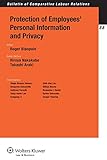Protection of employees' personal information and privacy / general editor, Roger Blanpain ; guest editors, Hiroya Nakakubo, Takashi Araki ; contributors, Diego Alvarez Alonso [and nine others].
Series: Bulletin of comparative labour relations ; 88Publisher: Alphen aan den Rijn : Kluwer Law, [2014]Copyright date: ©2014Description: xvii, 247 pages : illustrations ; 25 cmContent type:- text
- unmediated
- volume
- 9789041156082
- 9041156089
| Item type | Current library | Home library | Collection | Call number | Materials specified | Copy number | Status | Date due | Barcode | |
|---|---|---|---|---|---|---|---|---|---|---|
| AM | PERPUSTAKAAN UNDANG-UNDANG | PERPUSTAKAAN UNDANG-UNDANG KOLEKSI AM-P. UNDANG-UNDANG | - | C67.13.P744 2 (Browse shelf(Opens below)) | 1 | Available | 00002129095 |
It is easy today and it will be more so in the future for employers to acquire, store, and transfer employees personal information through electronic devices. Accordingly, employee privacy has become a keen legal issue among developed countries in recent years. All are agreed that there should be effective legal measures to protect employees from improper collection and/or use of their personal information while still paying due consideration to employers valid business necessities. Some countries have tackled this issue with special legislation, while others have relied primarily on constitutional law or tort law. This collection of essays an outcome of the 12th Comparative Labour Law Seminar (Tokyo Seminar) hosted by the Japan Institute for Labour Policy and Training presents detailed country reports on the status of employee privacy law in Australia, China, France, Germany, Japan, Korea, Spain, Taiwan, the United Kingdom, and the United States. The papers were presented by distinguished labour law scholars, and are reproduced here with some revisions to reflect the lively discussions that took place at the meeting. For each country, the topics examined include the following: default rules regarding employees personal information and privacy; regulatory schemes and available remedies against violation; what personal information an employer is entitled to obtain; ways of striking a balance between employers legitimate interests and employees' privacy; safeguards designed to secure non-coercive employee consent; drug and alcohol testing; surveillance of employees off-duty conduct; disclosure of a disciplined employees name or other work-related information; employees right to access personal information retained by the employer; information used to care for employees health and safety and to consider family situations; and prior employers sharing of personal information with a prospective new employer. In this relatively new area of labour and employment law, in which tools are still developing as new problems emerge in real workplaces, the books overall comparative viewpoint is especially valuable. Scholars and practitioners alike will appreciate the insight gained into how specific national trends exhibit overlap and difference from a global perspective.
There are no comments on this title.

